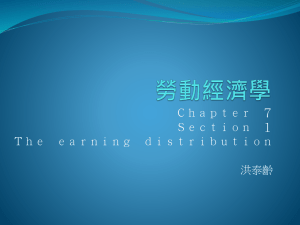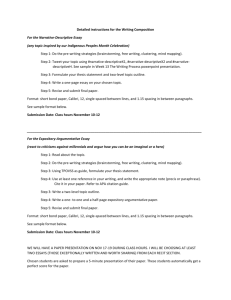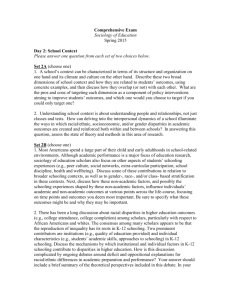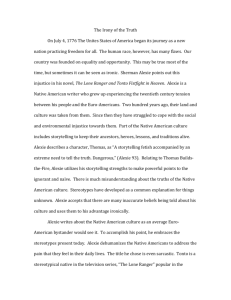File - Betsy Ferrer Okello
advertisement
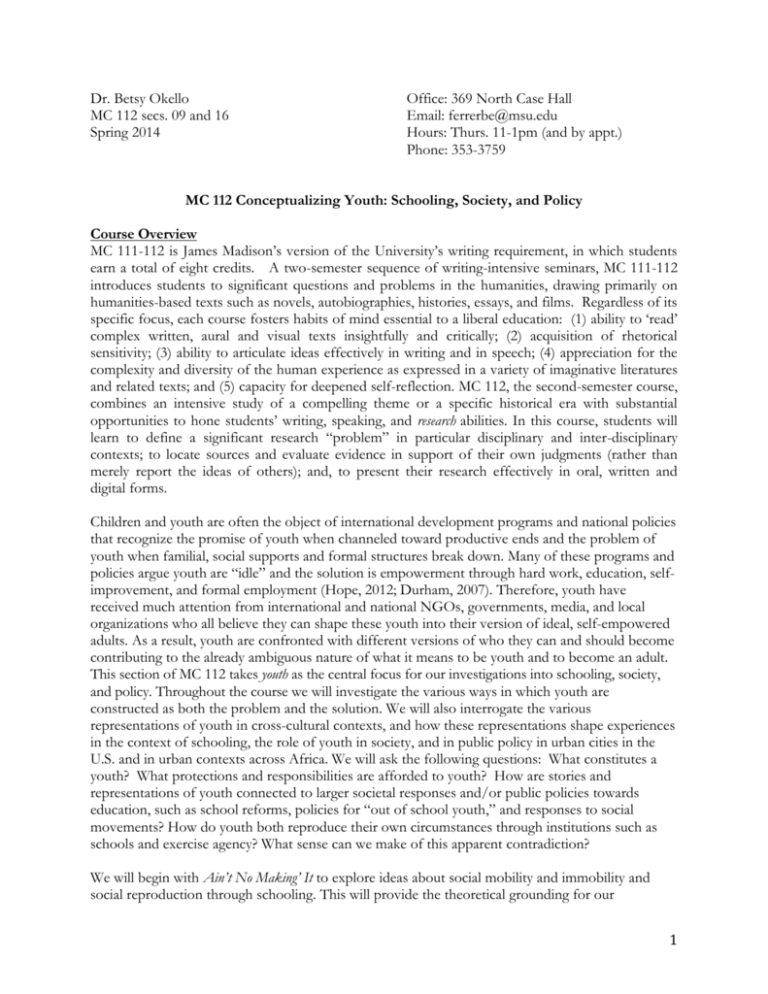
Dr. Betsy Okello MC 112 secs. 09 and 16 Spring 2014 Office: 369 North Case Hall Email: ferrerbe@msu.edu Hours: Thurs. 11-1pm (and by appt.) Phone: 353-3759 MC 112 Conceptualizing Youth: Schooling, Society, and Policy Course Overview MC 111-112 is James Madison’s version of the University’s writing requirement, in which students earn a total of eight credits. A two-semester sequence of writing-intensive seminars, MC 111-112 introduces students to significant questions and problems in the humanities, drawing primarily on humanities-based texts such as novels, autobiographies, histories, essays, and films. Regardless of its specific focus, each course fosters habits of mind essential to a liberal education: (1) ability to ‘read’ complex written, aural and visual texts insightfully and critically; (2) acquisition of rhetorical sensitivity; (3) ability to articulate ideas effectively in writing and in speech; (4) appreciation for the complexity and diversity of the human experience as expressed in a variety of imaginative literatures and related texts; and (5) capacity for deepened self-reflection. MC 112, the second-semester course, combines an intensive study of a compelling theme or a specific historical era with substantial opportunities to hone students’ writing, speaking, and research abilities. In this course, students will learn to define a significant research “problem” in particular disciplinary and inter-disciplinary contexts; to locate sources and evaluate evidence in support of their own judgments (rather than merely report the ideas of others); and, to present their research effectively in oral, written and digital forms. Children and youth are often the object of international development programs and national policies that recognize the promise of youth when channeled toward productive ends and the problem of youth when familial, social supports and formal structures break down. Many of these programs and policies argue youth are “idle” and the solution is empowerment through hard work, education, selfimprovement, and formal employment (Hope, 2012; Durham, 2007). Therefore, youth have received much attention from international and national NGOs, governments, media, and local organizations who all believe they can shape these youth into their version of ideal, self-empowered adults. As a result, youth are confronted with different versions of who they can and should become contributing to the already ambiguous nature of what it means to be youth and to become an adult. This section of MC 112 takes youth as the central focus for our investigations into schooling, society, and policy. Throughout the course we will investigate the various ways in which youth are constructed as both the problem and the solution. We will also interrogate the various representations of youth in cross-cultural contexts, and how these representations shape experiences in the context of schooling, the role of youth in society, and in public policy in urban cities in the U.S. and in urban contexts across Africa. We will ask the following questions: What constitutes a youth? What protections and responsibilities are afforded to youth? How are stories and representations of youth connected to larger societal responses and/or public policies towards education, such as school reforms, policies for “out of school youth,” and responses to social movements? How do youth both reproduce their own circumstances through institutions such as schools and exercise agency? What sense can we make of this apparent contradiction? We will begin with Ain’t No Making’ It to explore ideas about social mobility and immobility and social reproduction through schooling. This will provide the theoretical grounding for our 1 investigation of schools. Next we will turn to Sherman Alexie’s young adult novel The Absolutely True Diary of a Part Time Indian that tells the fictional story (though based on his own experience) of a Native American boy who leaves the reservation to attend an all-white school. In the second part of the semester, we turn our attention to international education, first through an educational ethnography, Lessons from Mount Kilimanjaro, and then through the novel Purple Hibiscus. Through these texts, we will explore issues in international education particularly related to gender, community, and popular culture. Required Texts: MacLeod, J. (2009). Ain’t no making it: Aspirations & attainment in a low-income neighborhood (3rd ed.). New York, NY: Westview. Alexie, S. (2007). The absolutely true diary of a part-time Indian. New York, NY: Little, Brown and Company. Stambach, A. (2000). Lessons from Mount Kilimanjaro: Schooling, community, and gender in East Africa. New York, NY: Routledge. Adiche, C. (2003). Purple hibiscus. Chapel Hill, NC: Algonquin Books. Excerpts from The Wire, Season 4 – Baltimore Schools Course Format This course requires active, engaged participation in both whole class and small group activities. As such, it is ESSENTIAL that all students come to class prepared to discuss all readings and materials and to interact with one another. You will be expected to work in formal and informal groups, sharing your interpretations and critical assessments of the assigned texts and each other’s work. Students will also be invited to facilitate large-class discussion on a regular basis. You will also work together outside of class time for assignments such as the document excavation project. Course Assignments Attendance and Informed participation 20% Your participation will be evaluated on sustained contribution to small group discussion (e.g. willingness to engage and to listen to peers and to speak for the group; doing the readings/work) and on sustained contribution to large-class discussion (e.g. asking probing and/or clarifying questions; drawing connections between texts and ideas; facilitating large-class discussion). In order to participate fully, you must have a copy of the reading/text with you during class along with notes you have made to contribute to discussion. This engagement may also include announced and unannounced quizzes, informal responses or in-class writes, and attendance. At the start of the semester, you will each write a participation agreement detailing how you plan to participate in class. You will have an opportunity to revise this agreement midway through the semester and then you will evaluate your own participation and provide evidence at the end of the semester. Critical commentaries portfolio 20% The purpose of the critical commentaries is to improve your understanding of the readings and the relationships between texts, and to improve the level of class discussions. It should be a critical take on—not just summary of—required course reading and discussions up to that point in the semester; it should incorporate textual 2 references; it should be clean of grammatical errors. You are required to write two critical commentaries throughout the semester. You will upload your commentaries to D2L prior to our class discussion. Everyone will have access to these. You may set your own deadlines, but must tell me these by January 27. The following list of questions will be helpful to keep in mind as you read each reading. What are the key ideas or concepts that the readings present? What argument is the author(s) trying to make? What does this reading have to do with particular aspects of youth, policy, and/or schooling? In what ways is the argument persuasive or not to you? Why? Why not? What do you think the author failed to consider about the issue? Why? Why not? Where do you agree/disagree with the author? Why? Why not? What strikes you as particularly interesting, curious, insightful, irritating, etc.? Document excavation and wiki site 25% This collaborative assignment asks you to work in groups of 2 or 3 to locate, situate, and evaluate ‘primary’ and ‘secondary’ texts on a specific issue related to education. We will brainstorm a list of topics as a class based on your interested and the course focus early in the semester. This assignment also requires some experimentation, creativity, and play—rather than write a traditional report or paper, the group will produce a wiki site as a resource for others to use who may be interested in the same topic. These will be linked to our class D2L site so that the entire class can benefit from your group’s knowledge and hard work. The group will also present their findings to the class in a short presentation. Research project 35% The research assignment asks you to work individually to research one issue or problem within the broader course topic. The research may involve historical, sociological, visual, and/or rhetorical analyses. There are three parts to the assignment: (1) the framing proposal and annotated bibliography of at least 15 sources; (2) final paper; and, (3) presentation of findings. Course Evaluation The following is based on University and Madison guidelines: A/4.0--Your work is excellent relative to the level necessary to meet course requirements; it is probing, perceptive, original and very well expressed. B/3.0--Your work is good relative to the level of course requirements; it demonstrates aboveaverage competence and is well expressed. C/2.0--Your work meets requirements of the assignment and is fairly well expressed. D/1.0--Your work meets minimum requirements for credit but shows definite weaknesses in thought and expression. F/0.0--Your work is unsatisfactory for credit because of major problems in thought or expression. 3 Course Policies Late work and attendance: If you do not have work completed for assigned sessions, or if you miss a scheduled conference, your final grade for that assignment will be lowered 1.0 point. University policy allows students two absences without penalty. Be aware, however, that your two allowed absences need to cover every possible conflict, and illness that might arise over the course of the semester. Whenever possible, let me know in advance if serious illness, family emergency, or religious obligations will cause you to miss more than two classes. Excessive absence will result in a failing grade for the course. Finally, you cannot pass this course unless all assignments are completed. Plagiarism means presenting the words, work, or opinions of someone else as your own (without proper acknowledgement). You commit plagiarism if you submit as your own work: (1) part or all of a written assignment copied or paraphrased from another student’s paper or notes; (2) part or all of an assignment copied or paraphrased (without proper acknowledgment) from a source such as a book, magazine, journal, website, or pamphlet. It is a very serious offense and usually quite easy to detect. The James Madison College and Michigan State University Policies on academic integrity and plagiarism will be strictly enforced if you commit plagiarism (0.0 for assignment at minimum; possible 0.0 for course grade). Please read the sections on plagiarism in the MSU Academic Programs catalogue and the JMC Student Handbook (available online). H-option: An opportunity for students who are interested in receiving honors credit for this course or who would simply like to enrich their studies. To earn an “H” designation on your transcript for this course, you will need a final grade of at least 3.5 in all of the normal course requirements and write a short paper. This semester the honors option will participate in an independent reading group facilitated by me. We will read an additional book on schooling – Annette Lareau’s Unequal childhoods: Class, race, and family life. Course Schedule Unit I: January The uses and purposes of schooling in the United States 13 Introduction to the course: review syllabus and expectations; begin discussion of topics of interest related to schooling. For Thursday: Bring in an artifact from your own school experience. What underlying assumptions can you uncover about the purpose of this artifact? What does the artifact tell you about the school’s expectations of you as a student? Be prepared to discuss in class. Read: Labaree: “Public goods, private goods: The American struggle over educational goals” (pp. 40-81) on D2L and Chapter 1 Ain’t No Makin’ It (p. 3-10) 15 Discuss the three historical purposes of American education and their conflicts Read: Chapters 2-4 Ain’t No Makin’ It (pp. 11-61). As you read, mark and define for yourself the following terms: achievement ideology, cultural capital, habitus, linguistic cultural capital, resistance, social reproduction 4 20 Building a concept map: developing a concept map for terms from prior readings – how do these terms fit together? What do they tell us about education? Discuss the influence of family and the differences between The Hallway Hangers and The Brothers Read: Chapters 5-6 (pp. 62-112) 22 Discussion of schools as institutions – how The Hallway Hangers and The Brothers experience schooling Watch selections from The Wire in class writing on thoughts about the clips. Read: Chapters 7-8 (pp. 113-153) 27 Discussion of reproduction and agency Due: Team assignments for document excavation project (sign-up for group conference; critical commentaries selections). Read: Chapters 9-10 (pp. 157-240) Groups choose which chapter to read and facilitate: Discuss reproduction theory and what happens to The Hallway Hangers eight years later 29 Group facilitated discussions Discussion: Document excavation assignment: research and design. Start prepping for document excavation assignment Read Chapter 11 (pp. 241-271) 3 and 5 Mandatory group conferencing—document excavation teams (no official class sessions). Teams are required to meet with me on one of two days, and to meet with each other during class time on the other day. February 10 Discuss class and race; structure and agency Read Chapters 12-13 (pp. 277-406) Groups choose which chapter to read and facilitate discussion 12 Group facilitated discussions (first half of class) In-class: Workshop document excavation assignment and website design (second half of class) Read: Chapter 14 (pp. 407-461) 17 Discuss analysis of the Hallway Hangers and Brothers and implications (first half of class) In-class: Workshop document excavation assignment and website design (second half of class) Read: Alexie (pp. 2-98) 5 19 Discuss Junior and his experience in light of Ain’t No Makin’ It Read: Alexie (pp. 99-168) 24 Discuss Alexie (first half of class) In-class presentations of document excavation—first set of groups. Read: Alexie (167-230) 26 Discuss Alexie (first half of class) In-class presentations of document excavation—second set of Groups (second half of class) March 1 (Sunday) Final document excavation due by 5:00pm to D2L. 3 In class viewing: additional clips from The Wire in conversation with our other core readings Finish discussion of Alexie; introduction to international education Read: Lessons from Mount Kilimanjaro Chapters 1-2 (pp. 1-47) 5 Discuss purposes of schooling in Tanzania versus purposes we discussed earlier of American education (Labaree) Due: Two working research questions. March 10 and 12 Spring Break—no Class. Unit II: International Education with a focus on Africa April 17 Review concepts from Kilimanjaro Read: Lessons from Mount Kilimanjaro Chapter 3-4 (pp. 48-79) 19 Discuss education for self-reliance and tradition Read: Chapter 4-5 (pp. 80-133) 24 Discuss gender and schooling Read: Chapters 6-7 (pp. 134-173) 26 Discuss popular culture and schooling and conclusion Work on draft of research proposal Read: Adiche pp. 3-70 31 and 4/1 Workshop rough drafts of research proposal and annotated bibliography in class. 7 Discuss Adichie’s Purple Hibiscus Due: Completed drafts of research project proposal and annotated bibliography. Read: Adiche pp. 71-161 9 Discuss Adichie’s Purple Hibiscus 6 Read: Adiche pp. 162-216 14 Continue discussion of Purple Hibiscus Read: Adiche pp. 217-307 16 Complete discussion of Purple Hibiscus. In-class: Assignment into research project teams—these teams will be responsible for peer critiquing each other’s rough drafts. You will submit these written comments to me as well. Workshop time for research projects All critical commentaries must be completed by April 16. 21 Due: Rough drafts of research project to me and team members at BEGINNING of class – peer edits, workshop. Continue to workshop drafts, edit – written peer critiques due by the END of class 23 Final research papers due. First set of presentations 28 Second set of research project presentations. 30 Third set of research project presentations 7




